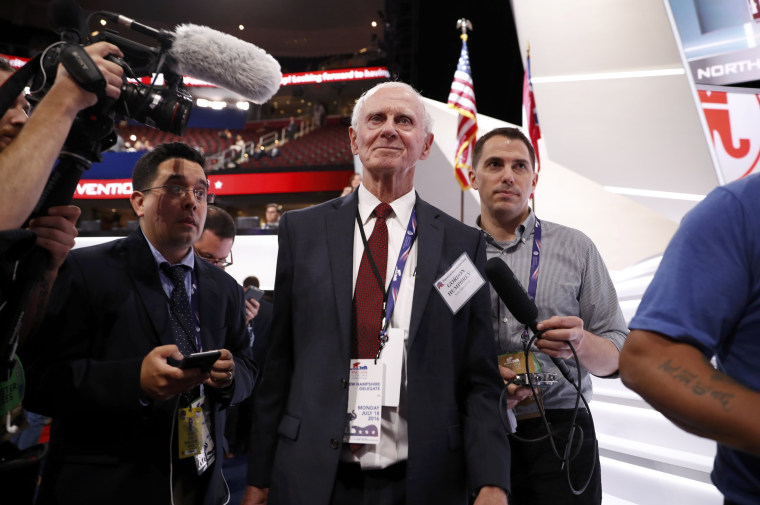CLEVELAND, Ohio — It officially ended here on Tuesday night but the lifespan of the Never Trump movement was short and disjointed. It manifested itself in different forms with different leaders, but its faults never overshadowed its passion.

It fought until the bitter end, ultimately falling under the weight of the very establishment it was awkwardly trying to help.
The last battle took place at Donald Trump’s convention by delegates who mustered one last attempt at derailing his nomination. Led by Christian high school teacher Kendal Unruh of Colorado, a supporter of Sen. Ted Cruz’s presidential efforts, they tried to change the convention rules so that delegates could “vote their conscience.”
After the group lost all attempts to alter the rules to their advantage the week before the convention started, Trump campaign manager Paul Manafort immediately boasted of their defeat. He called a Washington Post reporter and said “Never Trump is never more.”
While Manafort correctly predicted the end of the anti-Trump movement, which, in different iterations, had continuously pestered Trump’s political rise, he incorrectly predicted the timing.
Related: It's Official: Trump Wins GOP Presidential Nomination
Despite aggressive efforts by the Trump campaign and the Republican National Committee to quell dissent, anti-Trump delegates successfully caused uproar on the floor of the convention on the first day at a time when the Trump campaign and the Republican Party insisted that the party is unified.
Rep. Steve Womack of Arkansas, the chair of the convention at the time, used every advantage of being the chair to shut down attempts to alter the rules of the convention, stirring more anger at a heavy-handed Republican Party and a Trump candidacy fearful of dissent.
“Exercising your absolute power to subvert the will of the people at this convention is un-American,” Justin Everett, delegate of Colorado, said. "I hope this isn't a harbinger of what a Trump presidency would be like."
Anticipating the official roll call vote to nominate Trump on Tuesday, dissenting delegates plotted to slow down the process once again. They planned to force the chair of the convention to individually call on delegates so the could announce the candidate they supported.
But the idea had little impact and by the time Alabama Sen. Jeff Sessions placed Trump’s name into nomination, their plans had completely fallen apart because — despite a few exceptions — most of the states opposing Trump supported Cruz anyway, and they were able to give Cruz their delegates.
Alaska and Washington, D.C., which voted for Cruz and Florida Sen. Marco Rubio in the primary respectively, protested on the floor because the RNC wouldn't accept the primary results and counted all delegates for Trump, citing Republican Party rules.
Most delegates in both states were placated after the RNC heard their vote tally that didn't go to Trump. Most just wanted to be heard and acknowledged.
Hurt feelings did remain, however.
"They disenfranchised tens of thousands of Alaskans," former State Senator Dave Donley said.
What the anti-Trump delegates did, however, is show that the party is not completely united after a long, bruising primary with 17 candidates.
"We are done being used, GOP. Go win the presidency without us like you obviously believe you can. God is still in control. That I do know," Unruh posted on Facebook Wednesday morning, inferring that even though her organized efforts are over she will not support Trump.
The anti-Trump delegates follow a long line of efforts to dispose of Trump’s presidential ambitions that many argue was too little too late.
Related: Republicans Use Clinton to in Attempt to Unite GOP
The other presidential candidates, including the most well-financed, former Florida Gov. Jeb Bush and his allies, spent hardly any money against Trump, instead focusing on his other opponents.
After he spent six months at the top of the polls and the month before the Iowa caucuses on February 1, several super PACs, including Our Principles PAC, decided to spend more than $20 million against Trump.
Super PAC leaders insist that their efforts damaged Trump in critical states, including Iowa, but it didn’t knock Trump off his path to the nomination.
As Trump continued to inch closer to the nomination, high profile Republican leaders started becoming more vocal about their opposition. Former Republican presidential nominee Mitt Romney gave a scathing speech against Trump. But the speech lasted a news cycle and only angered and emboldened Trump’s supporters.
The ongoing problem plaguing the Never Trump movement, from the first days until its last, is that it never settled on an alternative.
The closest an alternative came was when conservative columnist Bill Kristol floated David French, a respected conservative and lawyer but known to few people and with no political experience. After less than a week of scrutiny, French decided against a run for president.
In the end, the organic evolution of the Never Trump movement was also its biggest flaw.
Now that Trump has officially won the nomination, the only Never Trump faction that remains is Hillary Clinton.
